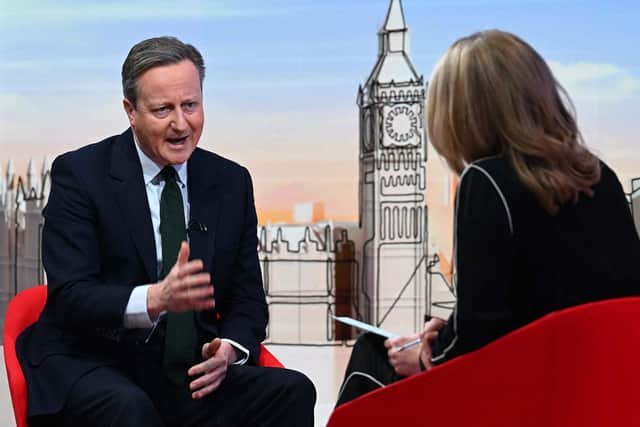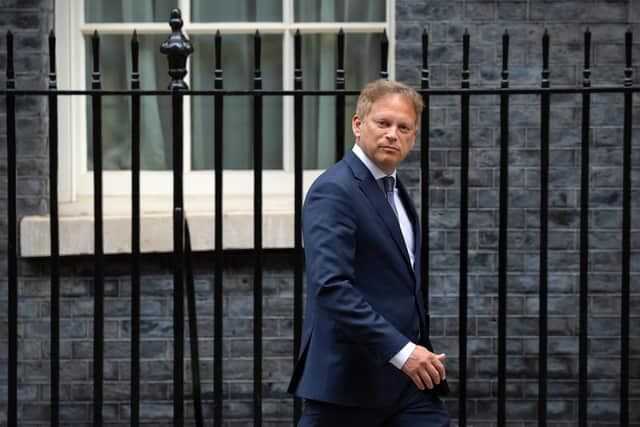Yemen bombings: Lord Cameron denies RAF strikes will escalate wars in Middle East as Stephen Flynn fears 'wider crisis'
Lord Cameron has declared the UK is "prepared to back our words with actions" as he defended RAF strikes in Yemen, warning the world faces a period of great peril.
The foreign secretary denied the US-led air strikes on Houthi military facilities across Yemen overnight on Thursday had escalated the situation in the Middle East.
Advertisement
Hide AdAdvertisement
Hide AdHe insisted it was the Houthi rebels who had taken steps to escalate conflict in the region with their attacks on container ships passing through the Red Sea, as he hinted the UK could join further strikes in future.


Lord Cameron issued the defence as SNP Westminster leader Stephen Flynn said the UK Government needed to set out its "medium and long-term aspirations", warning the US-UK air strikes in Yemen must not result in a "much wider crisis" in the region.
"[The Houthis] are not going to be deterred by the action that the Government has taken in consultation and in partnership with allies, so we need to understand what it is the Government is hoping to achieve here,” Mr Flynn said.
Prime Minister Rishi Sunak is due to give his first statement to MPs on Monday on the developing situation in Yemen. He has been criticised by certain opposition parties, the SNP and the Lib Dems, for not consulting Parliament in advance of the strikes.
The Houthis militant group, which backs Hamas, claims they have targeted ships with links to Israel.


The Houthis’ actions have posed a threat to the flow of global trade, disrupting merchant vessels from passing through the sea to the Suez Canal – a route that serves 15 per cent of world shipping.
Lord Cameron said the escalation had been “caused by the Houthis”.
“I mean the point is since November 19, you have had these 26 attacks”, Lord Cameron told the BBC’s Sunday with Laura Kuenssberg. He added: “There have been more of them, they have been getting worse, and you know, not acting is also a policy. It is a policy that doesn’t work.”
Advertisement
Hide AdAdvertisement
Hide AdLord Cameron suggested the RAF could join the US in further strikes against the Houthis to deter their attacks.
“It’s right we’ve sent this very clear, very unambiguous message that we are prepared to follow our words and warnings with actions,” he said.
Lord Cameron said the Houthis’ attacks were among a number of international events which meant the “lights are absolutely flashing red” on the global dashboard, and meanwhile sought to portray Mr Sunak as a stable and safe leader who could grasp the crisis.
He told Sky: “Our view is look, take a step back from this. It is hard to think of a time when there has been so much danger and insecurity and instability in the world. The lights are absolutely flashing red as it were on the global dashboard.”
Lord Cameron added: “What we need at that time is strong leadership and a clear plan. That is what we have with the Prime Minister and the team in place.”
Labour leader Sir Keir Starmer agreed the world was in a period of “volatility”, but said his party could also provide stability and “strong leadership” if elected to government.
“If we were privileged enough to come in to serve, we would provide that leadership with an approach which is to co-operate and collaborate on a rules-based basis, for ensuring that we can play our part in de-escalating these conflicts,” he told broadcasters.
Mr Flynn said it was important to defend freedom of navigation and to prevent further price increases for goods during a cost-of-living crisis.
Advertisement
Hide AdAdvertisement
Hide AdBut he told BBC Scotland's The Sunday Show: “If it's simply a case of saying that those airstrikes are going to defeat the Houthis, that's not going to happen – everyone knows that's not going to happen. So what comes next and how does this feed into the wider regional picture at this moment in time, which we know is extremely volatile?"
Mr Flynn said Westminster should have been recalled on Friday to allow MPs to be briefed and to scrutinise the Government.
He said: "We need to make sure that the action the Government has taken doesn't precipitate a much wider crisis in the region, nor indeed drag the UK or our allies into prolonged conflict in the Middle East given the impact that has had in the past, and given the UK's record on conflict in the Middle East in the past. So I'm looking for answers."
Lord Cameron defended the Government’s decision not to make a statement to Parliament about the strikes on Houthi military targets beforehand. The foreign secretary insisted Mr Sunak had “followed all the correct procedures” before the strikes, including assembling ministers, listening to advice, and consulting allies.
He said: “I don’t think it would have been right to have a debate and a vote before this sort of action, because I think it is important for reasons of operational security to on this occasion take the action and then have a statement in Parliament afterwards.”
Elsewhere, Lord Cameron said he did not agree with Turkey’s president Recep Tayyip Erdogan’s criticism that US-UK strikes were disproportionate.
Mr Erdogan had claimed the UK was turning the Red Sea into a “sea of blood”. “He is an important Nato ally, but in this case we don’t agree,” Lord Cameron said.
Some experts have warned the attacks could fuel a wider conflict in the Middle East, but Mr Sunak has insisted the UK and USA acted in “self defence” in carrying out the strikes.
Advertisement
Hide AdAdvertisement
Hide AdMr Shapps has called on Iran to urge its Houthi allies, as well as Hezbollah, to “cease and desist” in their destabilising activities in the Middle East.
A Houthi spokesman told the BBC the group "only target Israeli-linked ships" or those heading towards ports in the region, because they have declared war on Israel.
Comments
Want to join the conversation? Please or to comment on this article.